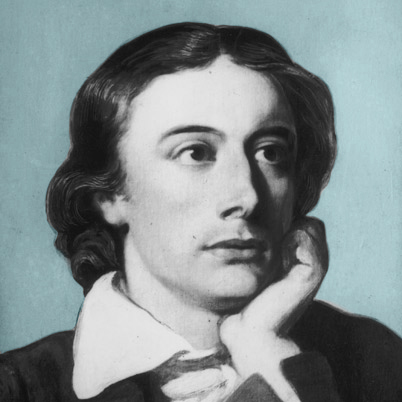
John Keats writes to Fanny Brawne, with whom he had been in love since meeting her the previous year. (Keats wrote his brother shortly after their first encounter, describing Fanny as “beautiful and elegant, graceful, silly, fashionable and strange.”) Fanny returned his intense feelings, although her widowed mother did not view Keats as a suitable match, and Keats had no financial prospects that would let him marry. In the summer of 1818 Keats moved to the Isle of Wight to focus on writing, explaining to Fanny in a letter, “I love you too much to venture to Hampstead. I feel it is not paying a visit, but venturing into a fire.” However, on October 10th, he saw her again and, overwhelmed, wrote the letter printed here. He moved back into London shortly thereafter.
October 13, 1819
My Dearest Girl
This moment I have set myself to copy some verses out fair. I cannot proceed with any degree of content. I must write you a line or two and see if that will assist in dismissing you from my Mind for ever so short a time. Upon my Soul I can think of nothing else. The time is passed when I had power to advise and warn you against the unpromising morning of my Life. My love has made me selfish. I cannot exist without you. I am forgetful of everything but seeing you again—my Life seems to stop there—I see no further. You have asorb’d me. I have a sensation at the present moment as though I was dissolving—I should be exquisitely miserable without the hope of soon seeing you. I should be afraid to separate myself far from you. My sweet Fanny, will your heart never change? My love, will it? I have no limit now to my love… Your note came in just here. I cannot be happier away from you. ‘Tis richer than an Argosy of Pearles. Do not threat [sic] me even in jest. I have been astonished that Men could die Martyrs for religion—I have shuddered at it. I shudder no more—I could be martyr’d for my Religion—Love is my religion—I could die for that. I could die for you. My Creed is Love and you are its only tenet. You have ravish’d me away by a Power I cannot resist; and yet I could resist till I saw you; and even since I have seen you I have endeavoured often “to reason against the reasons of my Love.” I can do that no more—the pain would be too great. My love is selfish. I cannot breathe without you.
Yours for ever
John Keats
From Famous Love Letters. Edited by Ronald Tamplin. Pleasantville: The Reader’s Digest Association, Inc, 1995. p. 96.


